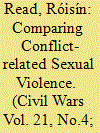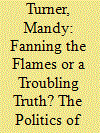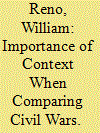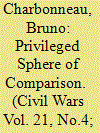| Srl | Item |
| 1 |
ID:
169940


|
|
|
|
|
| Summary/Abstract |
This paper explores knowledge production about sexual violence and highlights the role that comparison, across contexts and between different kinds of knowledge, plays in shaping what we know. It explores the role of strategic knowledge in creating thematic areas of international expertise and draws attention to the roles quantitative evidence and narrative testimony evidence have played in this field of knowledge. The paper addresses the role that comparison plays in producing both quantitative and qualitative data about sexual violence in conflict and considers the functional similarities in the ways these data are deployed to support sexual violence campaigning and advocacy.
|
|
|
|
|
|
|
|
|
|
|
|
|
|
|
|
| 2 |
ID:
169941


|
|
|
|
|
| Summary/Abstract |
The politics of comparison in the Israel-Palestine conflict is largely encapsulated in the use of two analogies. The first is the ‘Holocaust-Hitler analogy’ used by Israel and its supporters, which portrays Israel as a beleaguered nation surrounded by Nazi sympathisers who seek to destroy it as the Jewish homeland. The second is the ‘apartheid analogy’, which compares the conflict to that of Apartheid-era South Africa and portrays Palestinians as being the victims of racism and settler colonialism. This article analyses why, how and with what desired impact these two comparisons are invoked.
|
|
|
|
|
|
|
|
|
|
|
|
|
|
|
|
| 3 |
ID:
169939


|
|
|
|
|
| Summary/Abstract |
Comparisons of civil wars based on attention to contextual categories do a better job of conceptualising key variables such as ethnic identity, resources, armed group membership, and concepts such as rebellion and negotiation than do studies based on large data sets and methodological individualism. This article shows how important variables and concepts apply in ways that are particular to conflicts that follow the collapse of centralised authority based on personalist networks. Comparisons with civil wars in highly bureaucratised states highlight these differences, and illustrate fallacies of assuming that variables and concepts transcend the broad historical sweep of civil wars.
|
|
|
|
|
|
|
|
|
|
|
|
|
|
|
|
| 4 |
ID:
169943


|
|
|
|
|
| Summary/Abstract |
For years, there has been debate as to whether or not the Middle East experiences more armed conflict – and for different reasons – than other regions in the world. Absent is any consideration of the grounds upon which such regional comparisons are possible. Rather than providing a general account of regions, this article instead provides a theory of the Middle East based on the violent practices that have made and reproduced the Middle East as a region, both materially and ideationally. Though critical of comparative approaches to the study of armed conflicts, this argument models a different way to understand them.
|
|
|
|
|
|
|
|
|
|
|
|
|
|
|
|
| 5 |
ID:
169944


|
|
|
|
|
| Summary/Abstract |
Comparing conflicts intentionally and consciously ascribes meaning to a political subject. When Afghanistan is linked to Vietnam, or its democratic development to Switzerland, normative scales are introduced to order discursive practice. Discovering meaning and making meaning is what Simone de Beauvoir (1947) views as existential condition of human beings: political acts are measured against existing norms of the acceptable. In conjunction with Mannheim’s sociology of knowledge (2015), this article explains the social situatedness of crisis knowledge and the norms enshrined therein. In conflict comparisons, reservoirs of knowledge are being connected and repertoires of action prescribed. Based on these theoretical approaches, the article unpacks the power relations and political intentions at work in these comparisons.
|
|
|
|
|
|
|
|
|
|
|
|
|
|
|
|
| 6 |
ID:
169938


|
|
|
|
|
| Summary/Abstract |
This Special Issue emphasises how power and power relations involved in establishing limits and boundaries to define, categorise and understand the world through comparison are intimately tied to conflict and intervention practices and dynamics. Indeed, when pundits, practitioners, academics and even conflict actors compare settings of armed conflict and intervention, they are participating in an inherently political move. The most off-handed of comments connect to assemblages that enable the production of categories and concepts from which it becomes difficult to think differently. Our comparisons perform worlds of armed conflict, and international interventions more often than not reflect those performances.
|
|
|
|
|
|
|
|
|
|
|
|
|
|
|
|
| 7 |
ID:
169942


|
|
|
|
|
| Summary/Abstract |
Comparison is a method that cannot avoid that its concepts are approximations made for specific audiences or purposes. Deployed to compare armed conflicts, it naturalises the state as the central unit of analysis and the intervention as the external context. This article proposes a strategy that reveals the colonial legacies that form or perform the units of analysis. The possibility of comparing Côte d’Ivoire and Mali appears only when one considers a prior comparison: between Francophone Africa and other ‘worlds’. The construction of a French privileged sphere of intervention is inextricably tied to establishing a privileged sphere of comparison.
|
|
|
|
|
|
|
|
|
|
|
|
|
|
|
|